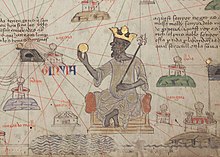Musa I of Mali
| Musa Keita I of Mali | |
|---|---|

Musa depicted holding a gold coin from the 1375 Catalan Atlas.
|
|
| Mansa of Mali | |
| Reign | c. 1312–37 (25 years) |
| Predecessor | Abubakari II |
| Successor | Maghan Musa |
| Born | 1280s Mali |
| Died |
c. 1337 Unknown |
| Spouse | Inari Kunate |
| Issue | Maghan Musa |
| House | Keita Dynasty |
| Father | Faga Laye |
| Religion | Islam |
Musa Keita I (c. 1280 – c. 1337) was the tenth Mansa, which translates as "sultan" (king) or "emperor", of the wealthy West African Mali Empire. At the time of Musa's rise to the throne, the Malian Empire consisted of territory formerly belonging to the Ghana Empire in present-day southern Mauritania and in Melle (Mali) and the immediate surrounding areas. Musa held many titles, including Emir of Melle, Lord of the Mines of Wangara, Conqueror of Ghanata, and at least a dozen others. It is said that Mansa Musa had conquered 24 cities, each with surrounding districts containing villages and estates, during his reign. During his reign Mali may have been the largest producer of gold in the world at a point of exceptional demand. One of the richest people in history, he is known to have been enormously wealthy; reported as being inconceivably rich by contemporaries, "There’s really no way to put an accurate number on his wealth" (Davidson 2015).
Musa Keita was referred to (and is most commonly found as) Mansa Musa in Western manuscripts and literature. His name also appears as Kankou Musa, Kankan Musa, and Kanku Musa. ‘Kankou’ is a popular Manding female name, thus Kankou Musa reads "Musa whose mother was Kankou".
Other alternatives are Mali-koy Kankan Musa, Gonga Musa, and the Lion of Mali.
What is known about the kings of the Malian Empire is taken from the writings of Arab scholars, including Al-Umari, Abu-sa'id Uthman ad-Dukkali, Ibn Khaldun, and Ibn Battuta. According to Ibn-Khaldun's comprehensive history of the Malian kings, Mansa Musa's grandfather was Abu-Bakr Keita (the Arabic equivalent to Bakari or Bogari, original name unknown − not the sahabiyy Abu Bakr), a brother of Sundiata Keita, the founder of the Malian Empire as recorded through oral histories. Abu-Bakr did not ascend the throne, and his son, Musa's father, Faga Laye, has no significance in the History of Mali.
...
Wikipedia
